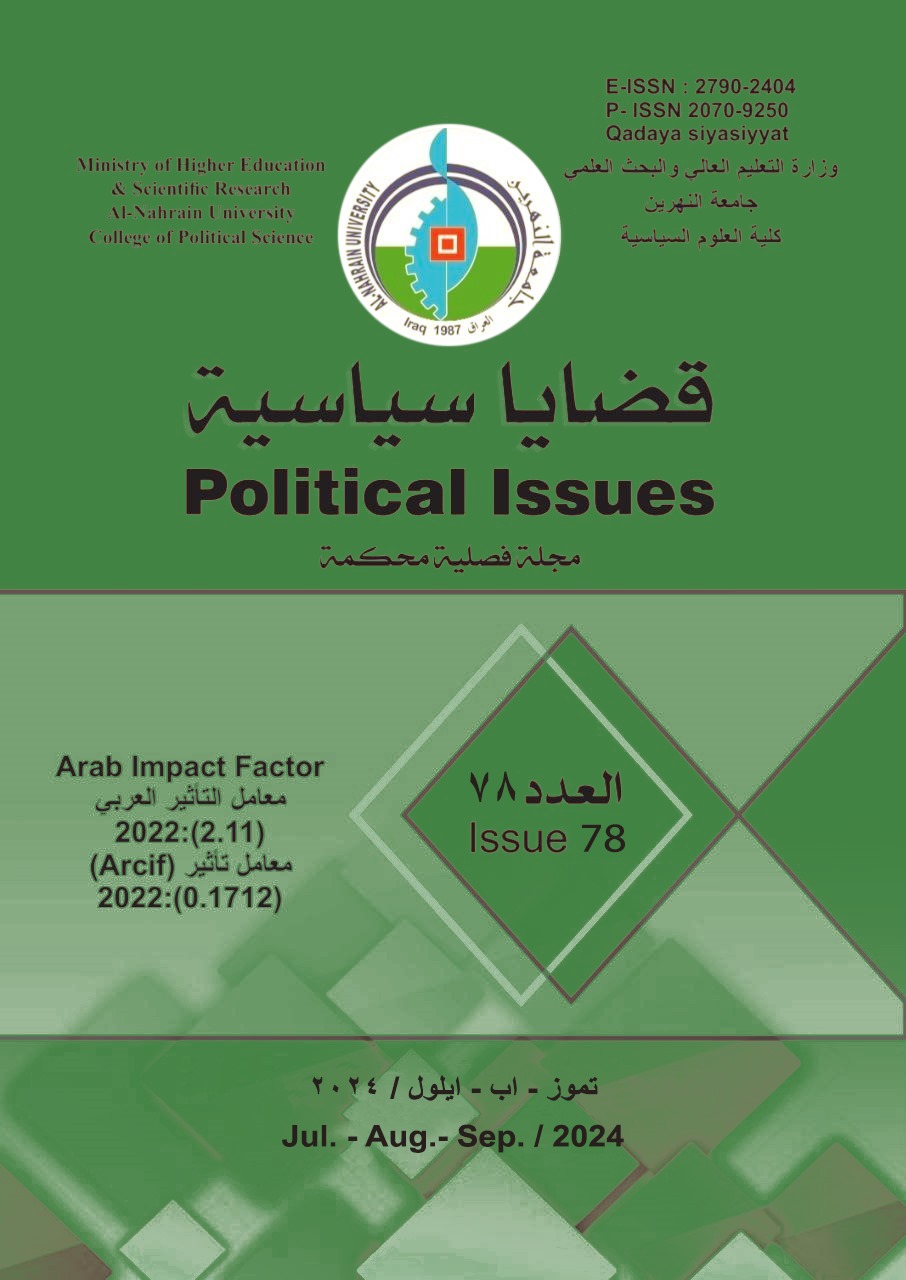الاثنيات الفرعية (الدينية_القومية) ودورها في اعادة بناء النظام السياسي العراقي بعد عام 2005
DOI:
https://doi.org/10.58298/782024455الكلمات المفتاحية:
العراق، الاثنيات ، النظام السياسي، الدين الاسلامي، القوميةالملخص
المراجع
The Iraqi Constitution of 2005.
Ahmed Wahban, Ethnic Conflicts and the Stability of the Contemporary World (Study of Ethnic Minorities and Movements), 1st edition, New University House, Alexandria, 1997.
Wafaa Lotfy, Multiple Societies, unpublished doctoral thesis, 6th of October University, Faculty of Economics and Political Science, Cairo, 2010.
Saad al-Din Ibrahim, Reflections on the Issue of Minorities, 1st edition, Dar Saad al-Sabah, Kuwait, 1992.
Majeed Hamid Arif, Ethnography of the Peoples of the World, Mosul University Press, 1990
Yassin Saad Muhammad al-Bakri, The Structure of Iraqi Society (The Dialectic of Authority and Diversity), Egypt Mortada Foundation, 2011.
Salim Matar, Table of Identities, Arab Foundation for Studies and Publishing, Beirut 2003.
Amin Farag Latif, Citizenship and its Role in the Integration of Pluralistic Societies, Dar Shatat for Publishing and Software, Egypt - UAE, 2012.
Yassin Al-Bakri, Hala Karim, Political Socialization and Democratic Transformation in Iraq, General Cultural Affairs, Baghdad, Iraq, 2013.
Hadi Hussein, Map of Ethnic Groups in Iraq, Iraqi Affairs Magazine, Al-Nahrain Studies Center, Al-Nahrain University, Issue: (8), 2018.
Abd Sami Abd al-Khalidi, religious minorities in Iraq and their role in building society (the Mandaean Sabians as a model), Yarmouk College Journal, Volume (13), Issue (1), 2021.
Saad Salloum, Minorities in Iraq, Iraq Paths Foundation for Cultural and Media Development, 2013.
United Nations, Security Council, Resolution 1483, issued on 5/22/2003.
Rand Rahim Franke, Democracy Monitoring in Iraq, Report No. (1) on the reality in Iraq, Al-Mustaqbal Al-Arabi Magazine, Issue (297), Center for Arab Unity Studies, November, 2003.
Salah Abdel Razzaq, The Religious Authority in Iraq, Parliamentary Elections, and Strengthening National Unity, 1st edition, Al Maaref Publishing Forum, Beirut, 2020.
Saad Muhammad Hassan, Ethnic Groups and Political Participation in the Arab Levant (Selected Models), Master’s Thesis (Unpublished), Faculty of Political Science, Al-Nahrain University, 2015.
Nibras Al-Mamouri, The Ordeal of the Constitution and Problems of Amendment, Al-Arabi Publishing and Distribution, Cairo, 2015.
Saad Shihab Ahmed Al-Sheikh, Consociational Democracy and its Reflection on the Political Performance of the Iraqi Political System after 2005, Arab Democratic Center, Berlin, 2022.
Abd Ali Kazem, The Iraqi Strategic Report 2010_2011, Bisan Publishing and Distribution House, Beirut, 2011.
Firas Abdel Karim, The Performance of the Iraqi Parliament after 2005, Reality and Ambition, Al-Mustansiriya Journal for Arab and International Studies, Issue (52), 2012.
Ahmed Yahya Al-Zuhairi, The Political Process in Iraq after 2003, 1st edition, Dar Al-Sanhouri, Beirut, 2017.
Ali Khalaf Abbas, Consensual Democracy, a Constitutional Study in the Constitution of the Republic of Iraq for the year 2005, Al-Ma’mun University Magazine, Issue (31), Baghdad, 2018.
Faleh Abdul Jabbar, The Dilemma of the Constitution (Criticism and Analysis), 1st edition, Publications of the Institute of Strategic Studies, Beirut, 2006.
Taha Ibrahim Abd, Executive Authority and Strengthening National Unity in Iraq after 2003, Master’s Thesis (unpublished), Al-Nahrain University, College of Political Science, 2017.
Zaid Adnan Mohsen, Components and Obstacles of the Political System (Iraq after 2005 as a Model), Political Issues Magazine, Issue (48_49), Al-Nahrain University, 2017.
Taha Hamid Hussein, The Role of the Judicial Institution in Building Democracy in Iraq, Resalat Al-Huquq Magazine, Faculty of Law, University of Karbala, Issue (1), 2014.
Yassin Muhammad Hamad, The negative repercussions of quotas on the institutional and societal structure of the democratic system in Iraq, Journal of International Studies, Issue (60), College of Political Science, University of Baghdad, 2015.
Hamza Mustafa, sectarian and ethnic quotas compete with independent bodies in Iraq, an article published on the World Information Network on March 21, 2015, access date September 21, 2023, available at the following electronic link: https://aawsat.com/home/article/317926/% %82
The New Encyclopedia Britannica, Encyclopedia Britannica, Chicago, 15th Edition, Vol 4, 1992.
Webster's New World Dictionary of American language, New Yorks The World Publishing Co, 1962.
Frederic Barth, Ethnic Groups and Boundaries, Little Brown, Boston, 1969.
الملفات الإضافية
منشور
إصدار
القسم
الرخصة
الحقوق الفكرية (c) 2024 زينب ححزة عبد شدهان

هذا العمل مرخص بموجب Creative Commons Attribution 4.0 International License.
هذه هي مقالـــــة منشـــــــــورة بنمط الوصـــــول الحـــــــر ومـــــــوزعة تحــــــت شــــــروط ترخيص المشاع الابداعي نسب المصنف (CC BY) 4.0 دولي التي تسمح بالاستخدام غير المقيد، التوزيع، واعادة الانتاج في أي وسيط أو صيغة، والتحوير أو البناء على المادة، بما في ذلك للأغراض التجارية، شريطة أن يتم نسب العمل للمؤلف الأصلي.




